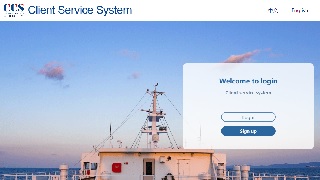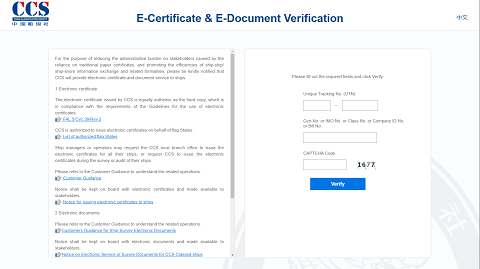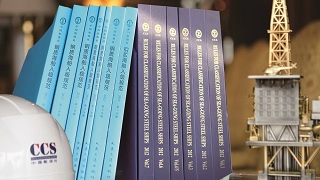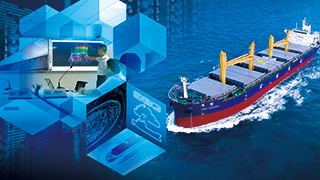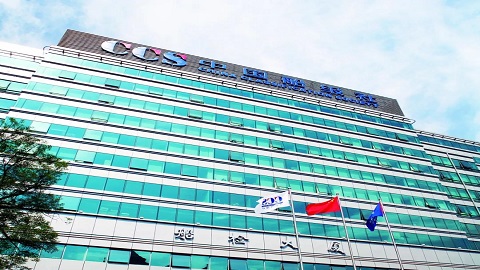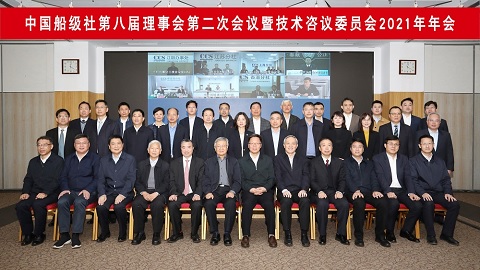
With the gradual
enhancement of global environmental awareness and the improvement of relevant
policies and regulations, it has become a trend in the transportation sector to
actively address climate change, accelerate energy transformation, and
continuously reduce environmental footprint. Developing environment-friendly
green ships with low energy consumption, low emissions, and high efficiency is
not only an inherent requirement for the maritime industry to ensure
sustainable development, but also an inevitable choice for the shipbuilding
industry to seek high-quality development. As an important technical support
institution for the international and domestic shipbuilding and shipping
industries, China Classification Society (CCS) upholds the objective of
“Safety, Environmental Protection and
Creating Value for Clients and Society”, fully serves the national “dual
carbon” strategy, actively leads the industry transformation process, fully
leverages the inherent advantages of long-term deep cultivation of scientific
and technological innovation, provides strong technical support for the
industry towards a green future, and contributes professional strength to accelerating
the construction of a strong transportation, maritime, and shipping country.
Fully advancing the application of clean energy on
water
CCS focuses on
establishing a standard system for the rules of green ecology, conducting
research on the application of clean energy, and promoting the comprehensive
development and utilization of new energy to promote the development of green
and low-carbon ships.
In 2012, CCS
officially released the world’s first “Rules for Green Ships” for energy
conservation, environmental protection, and working environment, which defines
the concept of “green ships” for the first time, guiding and promoting the
transformation of the development concepts as well as optimization and
upgrading in shipbuilding, shipping, and related manufacturing industries
Starting from the “Rules for Green Ships”, CCS has taken a big step towards
green-leading, and laid a solid foundation for the technological development
and research of future green ships. Afterwards, CCS has constantly upgraded and
improved the “Rules for Green Ships”, tracked industry demands, and
continuously promoted the upgrading of the standards for green new
technologies. It has also integrated new connotations and requirements of green
ecological development into the original rules, and updated them in a timely
manner. CCS has not only launched the “Rules for Green Eco-Ships” with
environmental protection and ecological protection as two core elements in
2022, established a complete target system for the rules of green ships, but
also successively released nearly 90 rules and guidelines related to green
ecology, building a clear framework and pointing out a specific direction for
the development of green ships. It is one of the core targets of CCS to
continuously benefit the industry through practical action based on scientific
research. Therefore, in recent years, CCS has continuously increased its
efforts in the application of clean energy represented by alternative fuels,
and fruitful results has been achieved.
In the field of
LNG fuel, in 2022, the “YUAN RUI YANG” ship slowly set sail with slight
vibration and deep roars, firmly sailing towards the vast ocean. This ship is
of great significance as it is the world’s first LNG dual-fuel ultra-large
crude tanker built for COSCO Shipping Group. Its successful delivery has not
only demonstrated China’s leading position in green, environment-friendly, and
energy-saving technologies in the world, but also represented a significant
breakthrough of China’s shipbuilding industry in the field of large-scale clean
energy power technology. The ship was independently drawing reviewed and
surveyed by CCS. It can be said that CCS has achieved unprecedented
breakthroughs in the technical services of large-scale clean energy powered
ships and the application of LNG as the main fuel for ultra-large crude
tankers. In the same year, China’s first C-type tank special LNG bunkering
vessel “XIN AO PU TUO HAO” was delivered, which further consolidated CCS’s
leading position in the design and construction of LNG bunkering vessels. As
the saying that a minute on the stage bases on ten years’ hard work. Behind
these achievements are the unremitting efforts of CCS in LNG for more than 10
years. So far, CCS has basically established a technical standard system for
the whole water LNG industry chain covering LNG water transportation,
bunkering, utilization, etc. CCS has provided classification services for over
200 LNG-powered ships, including inland and sea-going vessels, and can provide
LNG Ready solutions for three mainstream ship types: large oil tankers,
ultra-large ore carriers, and ultra-large container ships.
CCS has made
significant progress in methanol power, hydrogen fuel cells, ammonia fuel, wind
resources, etc., highlighting its unique value in the service industry.
In the field of
methanol fuel, CCS has demonstrated multiple important achievements in
promoting innovative applications of green ship technology through a series of
significant “first ships” and “first certificates”, continuously contributing
to industry progress. In February 2022, CCS issued the AIP certificate for the
design scheme of China’s first green methanol-powered VLCC vessel jointly
developed by COSCO Shipping Energy Transportation Co., Ltd. and Dalian
Shipbuilding Industry Co., Ltd., marking a new beginning in the design of
methanol-powered vessels in China. On April 10, 2024, the world’s largest and
China’s first methanol bunkering ship “Hai Gang Zhi Yuan” successfully
completed its first “ship-to-ship” synchronous bunkering operation for the
“Astrid M?rsk” ship docked at Guandong Wharf in Yangshan Port, Shanghai. CCS
has facilitated Shanghai Port to become the third port in the world to have
this capacity. It can be said that CCS has formed a service capability covering
the whole methanol industry chain, and provided comprehensive design approval
and classification services for various types of methanol-powered vessels,
including VLCC, pulp carriers, bulk carriers, container ships, chemical
tankers, etc. With its expertise in the methanol fuel field, CCS has injected
surging green momentum into the sustainable development of the industry.
In the field of
hydrogen fuel, in October 2023, China’s first hydrogen fuel cell power ship
“Sanxia Qingzhou 1” (Three Gorges Hydrogen Boat No. 1) made its maiden voyage
in Yichang, Hubei, the starting point of the Three Gorges of the Yangtze River,
and sailed along the Yangtze River, becoming a unique scenic view of the Golden
Waterway. This marks a breakthrough in zero application of hydrogen fuel cell
technology in inland ships in China. Behind this, there is also CCS’s
technological accumulation and support in the field of hydrogen fuel. In less
than two years from staring construction in May 2022 to its maiden voyage, the
CCS project team has built the design and construction systems and testing
specifications for hydrogen ships, which successfully promoted the
demonstrative application of China’s first classified CCS hydrogen ship “Sanxia
Qingzhou 1”. Based on this project, CCS has also carried out multiple national
key R&d plans and high-tech ship research projects, which marks a crucial
step of promoting the application of hydrogen fuel cell technology in inland
ships in China from scratch, and produced a series of international-leading
scientific and technological achievements. CCS is also continuously improving
the construction rules and product inspection standard system for hydrogen-powered
ships while making technological breakthroughs. CCS has formulated the
guidelines for application of fuel cell power generation devices, product
inspection standards for marine hydrogen fuel cell systems, and rules for
hydrogen fuel bunkering operations, which has not only accelerated the
application speed of hydrogen fuel cell products in the marine field, but also
effectively improved the applicability and safety of the technology.
In the field of
ammonia fuel, CCS is also making unremitting efforts in R&D. Currently, CCS
has mastered the key technologies related to the layout, storage, bunkering,
supply, firefighting, etc. of ammonia-fueled ships, and compiled the
“Guidelines for Ships Using Ammonia Fuel” that clarifies the safety technical
requirements for ships using ammonia fuel, providing effective basis for the
design, drawing review, construction, and survey of ships.
It can be seen
that CCS is committed to providing comprehensive green ship technology services
for the industry to promote green development of the shipping industry, and
meet the urgent demand of society for clean energy.
Promoting the innovative application of green ship
technology
It is a firm
target of CCS to promote the innovative application of green ship technology.
CCS is striving to lead the shipping industry to achieve green and low-carbon
transformation, and shape environment-friendly ships as the model of global
green navigation by widely promoting clean energy. In order to better serve the
industry, CCS has conducted extensive research on key technologies for
improving ship energy efficiency and shipborne carbon capture technology,
including wind turbine propulsion, hard wing sail propulsion, air
lubrication/air layer drag reduction, efficient propellers, energy-saving
appendages, waste heat recovery and utilization, solar photovoltaic, etc. CCS
has formulated more than 10 application guidelines, and can provide
comprehensive technical assessment, AIP and actual ship classification
services.
In terms of sailing-assisted
technology, in November 2018, the 308,000T ultra large oil tanker “Kaili”
independently developed and built by China was officially delivered for use. It
was the first time that the experimental sail-assisted propulsion device was
installed on this VLCC for starting sailing and operation. With this innovative
technology, 3% of the fuel required for navigation can be saved every day. CCS
has deeply participated and mastered key technologies in the design,
manufacturing, and application of winged sails in the project, walking at the
forefront of future ship technology. This is a good achievement and also the
beginning of CCS to provide wing-shaped sails services to the industry. In
September 2022, a handover and naming ceremony for the world’s first two-wing
powered sails VLCC ordered by China Merchants Energy Shipping Co.,Ltd. was held
in Dalian. The ship was provided with classification services by CCS, and is
also the world’s first two-wing powered sails VLCC. It is equipped with two
pairs of new large hard wing-shaped sails, and it is expected to achieve an
average annual fuel consumption savings of over 9.8% with the use of the
sailing device. These research results have provided valuable practical
experience for CCS to conduct in-depth research on the utilization of wind
energy resources. CCS has successively released the “Guidelines for Evaluation
and Inspection of Marine Hard Wing Sails” and the “Guidelines for Wind-Assisted
Propulsion System for Ships”, and formed the classification survey and
technical service capabilities in this field. At the same time, CCS can also
provide EEDI/EEXI contribution assessment services for ships with such devices
to ensure the achievement of the installation goals.
Air lubrication
and air layer drag reduction are also highly-recognized green and energy-saving
technologies for ships in recent years, and are also one of the driving forces
of CCS technology. In 2019, the innovative energy-saving technology developed
by CMES-Tech under the 703th Research Institute of China Shipbuilding Industry
Corporation (CSIC) ——Air Layer Drag Reduction System for Ships, was awarded the
first AIP certificate for air layer drag reduction system for ships in China by
CCS. In January 2023, the 307,000T ultra large intelligent crude oil tanker
“New Splendor” surveyed by CCS was officially delivered. As a Green-ECO demonstration ship, it was first
equipped with a gas layer drag reduction system with independent intellectual
property rights of Chinese ships. It has become the first energy-saving and
environmentally-friendly VLCC in the world to adopt gas layer drag reduction
technology, leading the progress of green and energy-saving technology for
large ships. The technology-leading requires a strong R&D foundation. After
years of research, CCS released the “Guidelines for Surveys of Air Lubrication
and Drag Reduction Systems of Ships (2020)” in 2020. This guideline is
applicable to sea-going vessels that are installed with air lubrication and
drag reduction systems, including new and modified ships. It is of great
significance for promoting the practical application of air lubrication and
drag reduction technology on ships, and meeting the Phase III requirements of
EEDI for new ships under the greenhouse gas emission reduction strategy and the
EEXI and CII requirements for in-service ships.
As a strategic and
disruptive technology to achieve large-scale low-carbon utilization of fossil
energy, carbon dioxide capture, storage, and utilization (CCUS) technology is
an important means to reduce carbon dioxide emissions, ensure energy safety,
build ecological civilization, and achieve sustainable development in the
future. In order to fully utilize this technology in promoting ship emissions
reduction, CCS has collaborated with the industry to conduct research on
shipborne carbon capture technology, formulated the technical requirements for
“Additional markings for Onboard Carbon Capture System: OCCS”, launched the
“Guidelines for Carbon Capture Systems in Ship Applications”, and provided
technical services including AIP, risk assessment, etc. In March 2023, CCS
issued the AIP certificate for a new low-carbon emission very large gas carrier
(VLGC) with OCCS to Jiangnan Shipyard (Group) Co., Ltd., paving the way for the
actual ship application of OCCS. In January 2024, CCS issued the world’s first
OCCS type approval certificate to Shanghai Marine Diesel Engine Research
Institute (SMDERI), marking a new breakthrough for CCS in the field of shipping
decarbonization.
CCS is actively
promoting environmentally-friendly ships and clean energy technology and
serving green shipping with innovative technologies. CCS is committed to
providing more environmentally-friendly and more efficient navigation solutions
globally, and continuously contributing its professional strength to the green
development of the industry to meet the needs and expectations of industry
stakeholders for green shipping.
Jointly building a green shipping development industry
chain
It has been an
industry consensus to promote ship emissions reduction through new energy and
new technologies. However, the emission reduction target cannot be successfully
achieved without the joint efforts of all parties in the industry chain. CCS
has pointed out in its “2023 Low-carbon Development Outlook for Shipping”:
“under new rules and mechanisms, shipping emission reduction involves many
industries and entities including green fuel production and supply, ship
financing, technology development, equipment manufacturing, ship operation,
standards formulation, market trading, etc., far exceeding the scope of
traditional shipping supply chain.” To this end, CCS calls on relevant parties
to work together to promote the safe application of clean energy and green
technology in the shipping industry, build a green and sustainable shipping
development industry chain, and make joint efforts to achieve the lofty goal
and the beautiful vision of net zero emissions in shipping as soon as possible.
CCS is also actively implementing this concept through practical actions. In
recent years, CCS has collaborated with all stakeholders in the industry chain
to build a cooperation platform, gather multiple forces, gather wisdom from
multiple parties, vigorously promote cross-industry and multidisciplinary
knowledge sharing, continuously strengthen scientific and technological
collaboration, and strive to provide feasible solutions for the better and
faster green transformation of shipping.
CCS officially
established the Laboratory for Water Application Safety of New Energy and Green
Technology in 2021, and has closely cooperated with universities, research
institutes, energy, shipbuilding, shipping and other industry units to seek
collaborative innovation. Later, CCS has successively signed the agreement on
joint construction of the New Energy and Green Technology Test Base with
Zhangjiagang CIMC Sanctum Cryogenic Equipment Co., Ltd., Harbin Engineering
University, etc. to jointly build new energy and green technology test bases,
and cooperated to carry out research on key technologies, test verification,
and regulatory standards related to clean power for ships. In addition, to
promote technological cooperation between China and the international maritime
community, CCS has collaborated with the global leading container shipping
logistics company A.P. Moller - Maersk and representative enterprises and
institutions in China and Europe to jointly launch a joint scientific research
project to accelerate the decarbonization of the global shipping industry.
According to the cooperation framework agreement, both parties are conducting
collaborative research in three aspects: risk assessment and standards
formulation of alternative fuels, assessment of lifecycle GHG emissions from ships
using alternative fuels and research on their sustainability, availability, and
supporting capabilities, as well as R&D of methanol/ammonia fuel container
ships.
In November 2022,
CCS, in collaboration with China Petrochemical Corporation, COSCO Shipping
Energy Transportation Co., Ltd., China Merchants Energy Shipping Co., Ltd., and
ICBC Financial Leasing Co., Ltd., jointly held the launching ceremony of the
“Sustainable Shipping Innovation & Development Initiative (SSIDI)” in
Beijing. As a collaborative research platform, the “Initiative” will focus on
conducting research on the economy, safety, technological maturity, policy
regulations, fuel availability, market mechanism, etc. of the application of
alternative fuels in the shipping industry, exploring the path of sustainable
shipping development for the industry. By upholding the principle of
“independent contribution, joint research, complementary advantages, and shared
achievements”, the members of the “Initiative” have carried out research and cooperation
on exploring the path of green and low-carbon development in shipping,
promoting the safe application and effective supply of clean energy in the
shipping field, promoting the interconnection of upstream and downstream
shipping and related industries, building an industry chain of sustainable
shipping innovation and development, strengthening strategic cooperation among
members to address climate change, winning a good social reputation for
sustainable development, etc.
In March 2024, the
opening ceremony for the Lingang New Area Green Shipping Industry Alliance was
held at the Lingang Center in Shanghai, which was jointly organized by CCS, the
Lingang New Area Management Committee, China COSCO Shipping Corporation
Limited, State Power Investment Corporation (SPIC), Shanghai International Port
(Group) Co., Ltd., and the Methanol Institute. The Alliance aims to accelerate
the green and low-carbon transformation of the international shipping industry,
promote upstream and downstream exchanges and cooperation in the industry
chain, actively participate in the formulation of standards and technology
R&D for green new energy including methanol, ammonia, etc., enhance the
green new energy bunkering service capacity of Shanghai Port, and cultivate a
carbon management team with international vision and global perspective. As an
open platform and cooperation mechanism, the Alliance focuses on promoting the
application of new green energy in the shipping industry, and promoting the
lifecycle green, low-carbon, and sustainable development of the shipping industry. The Alliance upholds
benchmarking against the highest international standards, and attracting
globally influential shipping and port enterprises, green and new energy
production and preparation enterprises, green fuel bunkering service
enterprises, carbon footprint monitoring and trading institutions, industry
funds, etc. to jointly achieve a whole industry chain layout. In the future,
CCS will closely follow the pace of ship technology innovation and development,
actively promote the application of new technologies in the shipping industry,
and jointly promote the new journey of green ships towards high-quality
development based on the goal of achieving green and low-carbon development.
Source: China Ship
Survey
Note: If you need to reprint, please indicate the source of the information.

